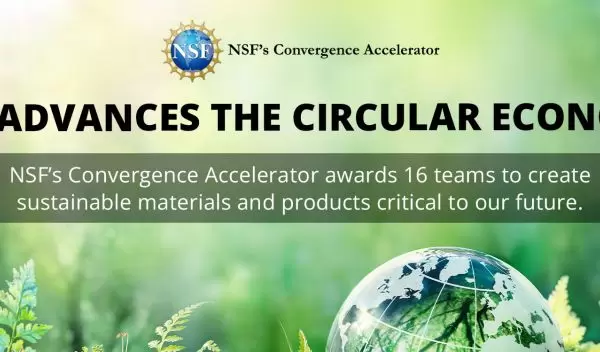
NSF advances sustainable materials solutions and capabilities
The U.S. National Science Foundation is accelerating convergence research across materials discovery and development as well as production and manufacturing to address challenges aligned to the manufacturing, reuse and recycling of critical materials and products.
With a total investment of $11.5 million, 16 Phase 1 multidisciplinary teams have been selected for NSF's Convergence Accelerator program's Track I: Sustainable Materials for Global Challenges. Australia’s national science agency, Commonwealth Scientific and Industrial Research Organisation, or CSIRO, is also contributing and will fund Australian researchers to participate on two U.S. projects.
The world is dependent on critical materials for every aspect of life and work. These materials are integral to energy, infrastructure, healthcare, economic development and national security. Approaches that consider a "circular economy" for materials are essential for the sustainable design of these materials and are intended to capture the full life cycle through their use in applications such as the built environment, semiconductors, polymers, and textiles.
"The production and use of materials today is not sustainable for our planet and human health," said Erwin Gianchandani, NSF assistant director for Technology, Innovation and Partnerships. "Creating environmentally – and economically – sustainable materials and products is critical to our future. The use-inspired solutions in which we are investing in today will advance the circular design of materials and manufacturing processes to reduce pollution and waste."
Gianchandani further noted, "We're thrilled to be able to work with Australia to create new solutions that could contribute to a more sustainable and resilient future."
Over the next nine months, teams will identify new team members and partners to support solution sustainability and participate in the Convergence Accelerator's hands-on innovation curriculum, designed to guide the teams in transforming their initial idea into a prototype. The curriculum includes fundamentals in human-centered design; team science; use-inspired research; early-stage prototyping; and communications, storytelling and pitching. Track I use-inspired solutions are focused on advancing fundamental materials science, including materials design and manufacturing processes; circular design to create environmentally and economically sustainable materials and products; and training methods to prepare the current and future workforce.
"Global-scale societal challenges require a convergence approach, which merges together innovative ideas, approaches, and technologies from a wide and diverse range of sectors and expertise," said Douglas Maughan, head of NSF’s Convergence Accelerator. "Through our program, teams will be challenged to take a systems-level view of materials and their production to develop environmentally sustainable approaches and capabilities important to our economy and national security."
The Track I topic was chosen based on the results of NSF-funded community workshops supported by the NSF's Convergence Accelerator ideation process. At the end of Phase 1, the teams will participate in a formal Phase 2 proposal and pitch. Over 24 months, selected Phase 2 teams will continue developing a solution and will create a sustainability plan.
The awardees include:
- A Tale of Two Cities Optimizing Circularity from Molecules to the Built Environment, led by the University of Georgia Research Foundation, Inc.
- Accelerating Use of Geologically-driven Engineering and Reclamation, or AUGER – A Predictive Approach to a Sustainable Critical Minerals Industry, led by Cornell University.
- Building a Sustainable, Innovative Ecosystem for Microchip Manufacturing, led by Massachusetts Institute of Technology.
- Designing for Circular Economies – Creating Impact from Local Plastic Waste Using Off-Grid Containerized 3D Printers & Practice Based Learning, led by re:3D Inc., featuring Australian partners University of Wollongong and Western Sydney University.
- Economically Sustainable Polypropylene Recycled Plastics Enabled by Compatibilizer Additives, led by Black & Decker (U.S.) Inc.
- Energy-efficient MetaConductors for Convergence of Sustainable Electronics, or E-MC2 of Sustainable Electronics, led by the University of Florida.
- Enhanced Biobased Textiles and Composites Via Microbially Produced Silk Proteins, led Rensselaer Polytechnic Institute
- Mind Over Matter: Socioresilient Materials Design: A New Paradigm For Addressing Global Challenges in Sustainability, led by Massachusetts Institute of Technology.
- OpenMatFlo: A Platform for Designing, Producing, and Supplying Greener Inks for Additive Construction under Uncertainties, led by the University of Florida.
- PFASTIR: PFAS Toolkit for Innovating Replacements, led by IBM Corporation – Almaden Research Center.
- Revolutionizing the Manufacture of Portland Cement Concretes Towards a Circular and Carbon-negative Future, led by University of Alabama.
- Securing Critical Material Supply Chains by Enabling phOtovoltaic Circularity, or SOLAR, led by Battelle Memorial Institute.
- Sustainable Materials for Global Challenges: Recycled Textile and Apparel Manufacturing Ecosystems, or RETAME, led by the University of Delaware
- Sustainable Nature-based Nanomaterials for Remediation Solutions to Climate Change, led by the Research Foundation for The State University of New York, featuring Australian partner, the University of Queensland.
- Sustainable Topological Energy Materials, or STEM, for Energy-efficient Applications, led by Massachusetts Institute of Technology.
- Toward Water Circularity: Mining Green Hydrogen and Value-Added Materials from Hypersaline Brines, led by Oregon State University.
Launched in 2019, the Convergence Accelerator — a Directorate for Technology, Innovation and Partnerships, or TIP, program — builds upon NSF's investment in basic research and discovery to accelerate solutions toward societal and economic impact. Convergence Accelerator multidisciplinary teams use convergence research fundamentals and innovation processes to stimulate innovative idea sharing and development of sustainable solutions.
CSIRO's partnership with NSF is focused on establishing pathways for expanding and deepening research collaborations between the U.S. and Australia. The collaboration with NSF's Convergence Accelerator is to accelerate use-inspired convergence research in areas of societal and economic importance.


